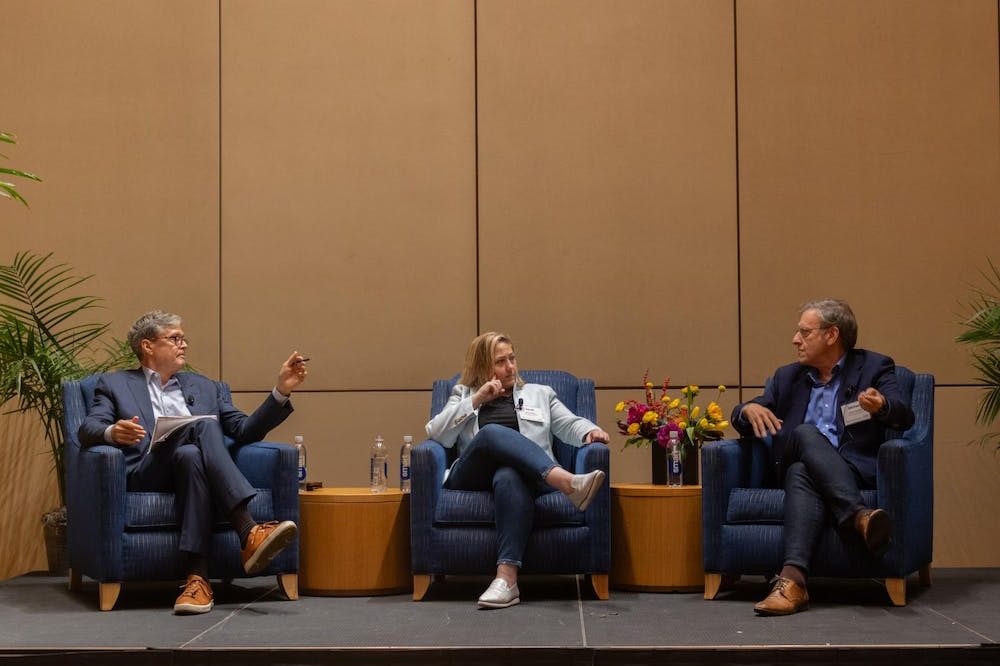
Polis Recap:
The 2024 Election, One Year Out
Rosa Golchin (PPS '24)
Oct 31, 2023
On Monday, October 30th, Polis: Center for Politics and the Duke Triangle Alumni Chapter jointly hosted The 2024 Election: One Year Out, a conversation moderated by Duke alumni and POLIS Distinguished Fellow John Hardwood (‘78) featuring two leading national political strategists: Sarah Longwell, President and CEO of Longwell Partners and Publisher of The Bulwark, and Michael Podhorzer, Senior Fellow at the Center for American Progress and former political director of the AFL-CIO. The event centered on the direction of President Biden and former President Trump’s campaigns, the role of the media in democratic systems, and the implications of this election for the future of American democracy.
The event began with an introduction from Dr. Deondra Rose, director of POLIS and Kevin D. Gorter Associate Professor of Public Policy, History, and Political Science. Dr. Rose highlighted POLIS’s role in connecting the Duke community to “amazing thought leaders,” as she welcomed Harwood, an accomplished journalist who has provided coverage for CNBC, CNN, The New York Times, and The Wall Street Journal. He has interviewed every president from George H.W. Bush to President Biden, with whom he recently spoke with in his Bedeviled podcast.
The program started with Harwood offering praise for the panelists for “cutting through the conventional narratives” of political commentary. He followed by asking for their predictions on the 2024 election outcome. Podhorzer expressed his view of politics as being “stuck between the 49-yard line,” which will inevitably lead half of voters dissatisfied. In a climate where people have real stakes, they are faced with a choice of two candidates who present drastically different visions for the future. Longwell added that third-party candidates, such as Robert F. Kennedy Jr., will fracture the anti-Trump coalition and could contribute to Trump’s electoral base. Speaking from her experience in voter interactions and polling, she has found that a no-labels candidate is most likely to win voters from the center-right. Like Podhorzer, she underscored the colossal consequences of the upcoming election, stating that “the next election is going to be existential,” not only for American democracy but also for the global state of affairs.
The focus of the conversation soon turned towards the role of the media, an actor whose prominence has been of increasing salience in forming political narratives. Podhorzer, drawing from his experience observing Democratic party campaigns, proclaimed that the way the media covers candidates matters more than the party’s own messaging. Harwood, a veteran of the media, expressed surprise that the media’s influence was appraised so highly, though both panelists concluded that the media has considerable sway in determining which topics receive coverage and therefore influences agenda-setting. Longwell pointed out that the Republican party has a more homogenous and dedicated media ecosystem, while the mainstream media is not as coherent with its messaging to rally behind a Democratic candidate. She also raised the matter of how public this election will be, as opposed to the 2020 election which occurred in the shadow of the pandemic. The nature of this election being so highly covered could provide an advantage to the candidate who is more vocal and perceived as energetic, especially in light of concerns about candidates’ ages from voters across the political spectrum.
Given both panelists’ background in conducting and studying polling, the matter soon came to the forefront of the conversation. Podhorzer presented his notion of “mad poll disease,” wherein polling methodology is constantly called into question and leads to anxiety and “feelings of helplessness about democracy.” He explained that a presidential preference question is very context dependent, and polling asks us to “suspend disbelief and pretend we can know what will happen next November by asking people today.” There are inevitably issues of false precision and built-in assumptions with polling, and Podhorzer called upon attendees to consider the value of efforts to get-out-the-vote rather than becoming preoccupied with polling results.
The event concluded with audience Q&A, with questions raised concerning the challenges of voter turnout and impact of hot-button issues such as reproductive rights. The resounding conclusion of the conversation was that the 2024 election will almost certainly see another matchup between former president Donald Trump and current president Joe Biden, with both panelists favoring president Biden’s odds in achieving a victory, a victory which will largely determine the future of America’s democratic institutions.


